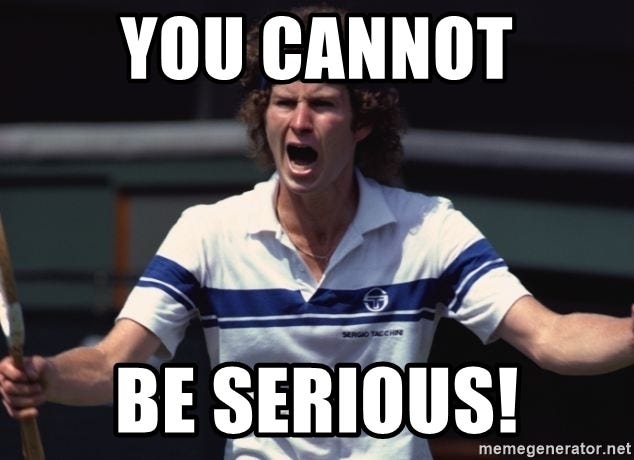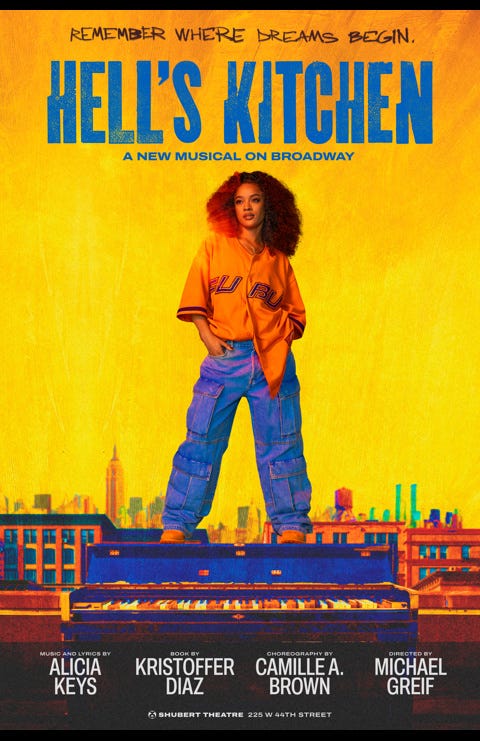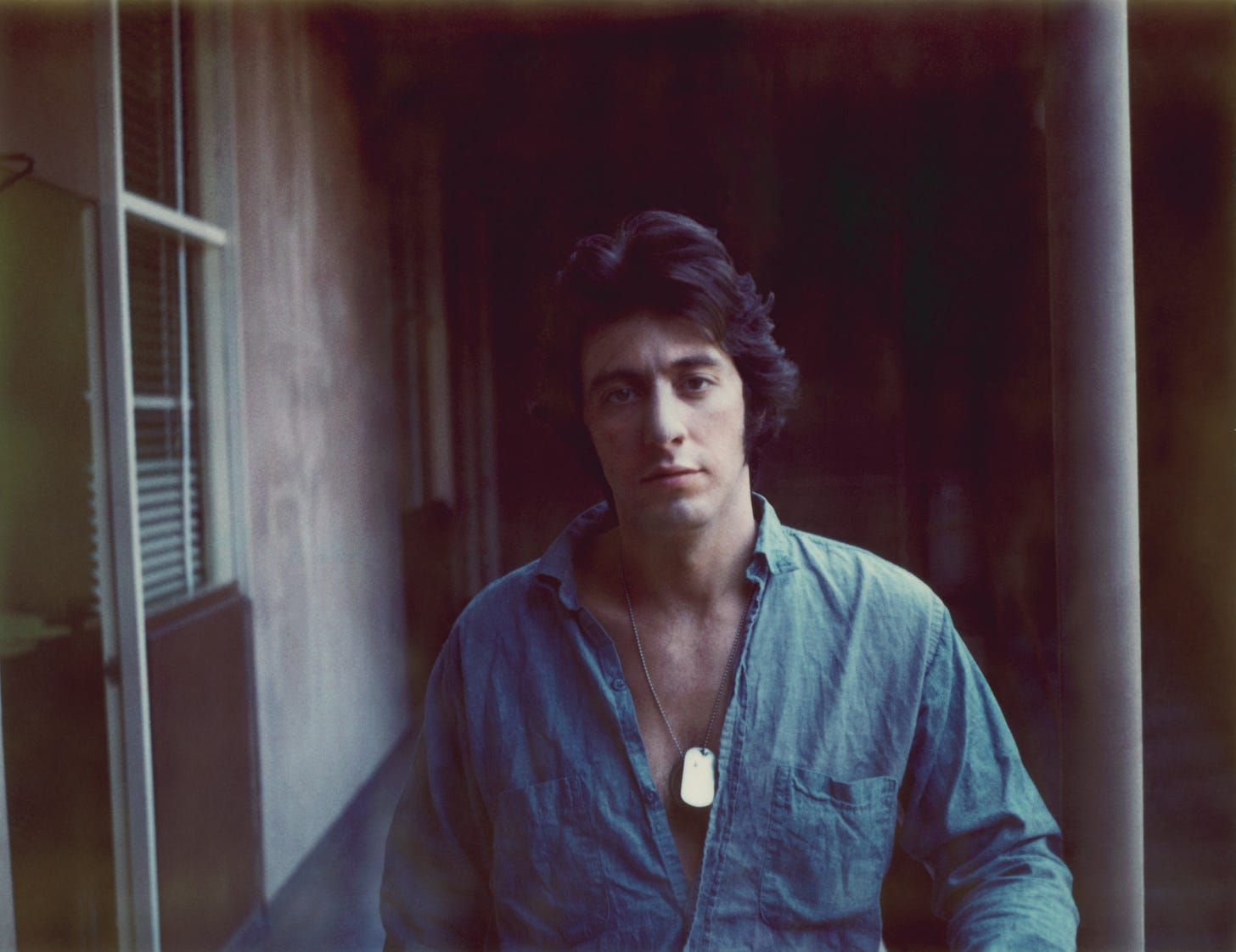I'm Serious
Two editions of The Best Newsletter in one week?
Oh, but I am!
The Best…
…Broadway Show I Saw This Week
Hell’s Kitchen — Music & Lyrics by Alicia Keys; Directed by Michael Greif
I’m always a little leery of the Broadway genre known as “jukebox musicals.” I’m not a huge musical theater person to begin with, and then taking a pop star’s songs and fashioning a story around them sometimes results in a less-than-compelling trip to the theater.
But there was so much positive chatter around Hell’s Kitchen, the show featuring the songs of Alicia Keys, I decided it was time to check it out. So with Lady Jay by my side, I headed to New York’s Shubert Theater on W. 44th Street to see this year’s Tony Award winner for Best Musical.
While the show isn’t totally autobiographical, it tells the contours of Keys’s upbringing in and around an apartment building called Manhattan Plaza in the Hell’s Kitchen section of New York City. Her avatar, a 17-year-old named Ali, butts heads with her overly-protective mother, chases boys, struggles to reconcile her relationship with her absentee father, and, yes, learns to play the piano.
Turns out, the hype for this show was warranted.
Although we were unlucky and didn’t get to see star Maleah Joi Moon in the role of Ali, her understudy Jade Milan did an admirable job in relief.
Shoshana Bean and Brandon Victor Dixon, as Ali’s parents, were both wonderful. But the performance that blew me away the most and brought tears to my eyes belonged to Kecia Lewis as Ali’s piano teacher. The power of her voice alone was worth the price of admission (she won the Tony for Best Performance by a Featured Actress in a Musical this year; imagine what it’s like to be in the theater when she sings this).
So for at least one jukebox musical, I can give my unqualified recommendation.
…Personal Essay I Read This Week
“Early Scenes: Remembering a Childhood in the South Bronx” — By Al Pacino, The New Yorker, August 26, 2024
In this first-person essay, Al Pacino describes his life — sometimes funny, sometimes mischievous, sometimes tragic — as a boy and young actor in New York City of the 1940s and ’50s.
Pacino’s story bears some fundamental similarities to that of Alicia Keys, albeit separated by four decades: New York was their playground and source of hard-knocks education; their protective mothers were a source of angst and, later, appreciation; their fathers were absent; and the arts saved their lives.
But while I went into Hell’s Kitchen knowing only the most famous of Keys’s songs, I’ve seen many of Pacino’s movies. About two dozen, by my count. Aside from learning about his obsession with Shakespeare in the documentary Looking for Richard, though, I knew very little about the man. So this essay was a terrific introduction. (As reader Britt K. pointed out to me, the essay is an excerpt from Pacino’s upcoming memoir, Sonny Boy. I look forward to checking it out.)
Reading about his life made me want to go back and watch one of my favorite Pacino films again. But which? Of course, I could have done any of The Godfather movies and been satisfied (yes, even Part III). Or Dog Day Afternoon. Heat, Donnie Brasco or Scent of a Woman. Or one of his indelible supporting roles, like in Glengarry Glen Ross or The Insider or Dick Tracy.
If I had Covid and were isolated in my bedroom for a few days, I would have watched them all. But alas, I am currently healthy. So I went with just one: Serpico (1973).
For me, Pacino’s portrayal of an honest New York City cop in a corrupt world brings out the best of his performance gifts: sensitivity, stubbornness, slow-burn anger, and the personification of moral clarity.
Just as when I saw it for the first time, probably 25 years ago, Serpico (directed by Sidney Lumet) still makes me angry about injustice and corruption, about the cost whistleblowers often pay for honesty. It still makes me distrustful of power and skeptical of those who seek it. And it still makes me love and appreciate the work of Al Pacino.
…Substack Post I Read This Week
“The End of a Tennis Era” — By Joe Posnanski, August 31, 2024
Last Friday, Novak Djokovic lost in the third round of the U.S. Open to someone named Alexei Popyrin.
After winning three Grand Slam singles titles in 2023 to push his career total to a record 24 majors, Djokovic has had a tough year. Yes, he won his much-coveted Olympic gold medal in Paris last month, but he went oh-for-the-majors in 2024 and, at age 37, finally looks mortal.
There have been whispers that his playing career is nearing its end, but in recent years, I’ve felt about him the way I did about the New York Yankees in the late 1990s and early 2000s — I’ll believe he’s going to lose when I see him lose.
Well, I was at Fenway Park for Game 4 of the 2004 American League Championship Series, when the Boston Red Sox began their unfathomable run to dethrone the Yankees and then win the World Series.
And I was at Arthur Ashe Stadium the night Djokovic lost to Popyrin.
It was a strange night. U.S. Open fans have long had an uneasy relationship with Djokovic, who has often played the villain to his generation’s more beloved stars, fellow “Big Three” members Roger Federer and Rafael Nadal.
But I suspect that even Novak-haters that night felt a little sad to face what his loss probably represents: the conclusion of an incredible era in sports. (Full disclosure: I’m a Roger guy.)
On his Substack, writer Joe Posnanski put Djokovic’s loss in perspective, noting how the year 2024 broke a Grand Slam titles streak for the Big Three that began back in 2003. I commend it to anyone who has ever marveled at Roger, Rafa, and Novak in their primes.





